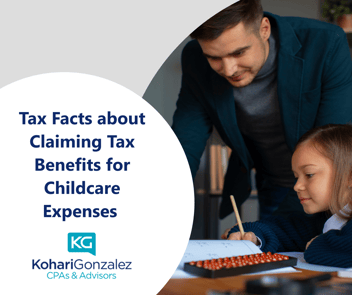 Child and dependent care tax credits are essential for families juggling the costs of child care. While the federal government provides a framework for these credits, many states have implemented their own versions to offer additional support.
Child and dependent care tax credits are essential for families juggling the costs of child care. While the federal government provides a framework for these credits, many states have implemented their own versions to offer additional support.
Here, we outline the child and dependent care tax credits available in each state, including eligibility criteria, credit amounts, and specific limitations as of September 2024.
Overview of Federal Child and Dependent Care Tax Credit
Before looking at state-specific information, it's essential to understand the federal Child and Dependent Care Tax Credit (CDCTC). This credit, often referred to simply as the Child Tax Care Credit or CTC, is available to families who incur expenses for the care of children under the age of 13 or for qualifying disabled dependents.
- Maximum Credit: Families can claim up to $3,000 for one qualifying individual or up to $6,000 for two or more.
- Credit Rate: The credit rate ranges from 20% to 35% of qualifying expenses, depending on the taxpayer's income.
- Eligibility: Parents must be working or looking for work to qualify for this credit. There are provisions for disabled and full-time student spouses.
State-by-State Breakdown
Alabama
Alabama does not have a state child tax credit, but families may claim the federal child tax credit on their state return.
Alaska
Alaska does not provide a child tax credit, but the state offers the Permanent Fund Dividend (PFD), which provides an annual payout to eligible residents, including children.
Arizona
Arizona does not offer a state child tax credit. However, families can claim the federal child tax credit and may also qualify for other benefits for dependents.
Arkansas
Arkansas does not have a state-specific child tax credit, but eligible residents may claim the federal child tax credit on their state return.
California
California offers a California Child Tax Credit (CTC) for low-income families. The CTC is worth up to $1,000 per child for those who meet the eligibility requirements.
Colorado
Colorado offers a state child tax credit for low-income families. The credit is a percentage of the federal child tax credit and can be claimed by those who qualify.
Connecticut
Connecticut has a Child Tax Rebate that provides up to $250 per child for eligible families. This is separate from the federal child tax credit.
Delaware
Delaware offers a child tax credit for families with children under age 17. The credit provides a maximum of $200 per qualifying child.
Florida
Florida does not have a state income tax and, therefore, does not offer a state child tax credit, but families can claim the federal child tax credit.
Georgia
Georgia provides a Child Tax Credit for qualifying families with children under the age of 18. The maximum credit is $200 per child.
Hawaii
Hawaii offers a State Dependent Care Tax Credit that can apply to childcare expenses for dependent children. The credit is income-based and varies according to the taxpayer's income level.
Idaho
Idaho provides a Child Tax Credit that can be claimed by families with qualifying children or dependents. The credit ranges from $0 to $205 per dependent child, depending on the taxpayer's income.
Illinois
Illinois offers a Property Tax Credit, but not a direct child tax credit. However, it does allow for a Standard Exemption that can reduce taxable income for families with children.
Indiana
Indiana provides a Child and Dependent Tax Credit that can be claimed by taxpayers for children under the age of 17. The amount of the credit depends on the taxpayer's income and the number of children claimed.
Iowa
Iowa offers a Child and Dependent Care Credit based on the taxpayer's income and child care expenses. This is separate from the federal child tax credit and applies to expenses incurred for the care of children under the age of 13.
Kansas
Kansas provides a Child Care Tax Credit for families with children who need dependent care services. This credit is intended to help offset some of the costs of childcare.
Kentucky
Kentucky has a Child and Dependent Care Tax Credit that provides tax relief for families who incur expenses for child care or care for dependents. The credit is based on a percentage of qualifying expenses and income.
Louisiana
Louisiana offers aChild Care Credit for taxpayers who pay for child care expenses. The amount varies based on the taxpayer's income.
Maine
Maine provides a Child Tax Credit for families with dependent children. The credit is income-based, and it offers a maximum benefit for low-income families.
Maryland
Maryland offers a State Child Tax Credit, which is available for low-income families. It is calculated as a percentage of the federal child tax credit and varies based on income.
Massachusetts
Massachusetts provides a State Child Tax Credit for families who meet specific income guidelines. The credit is available for taxpayers who claim a federal child tax credit.
Michigan
Michigan offers a State Child Tax Credit that provides tax relief for families. This credit is designed to help reduce the tax burden for working families with dependent children, particularly those with lower income.
Minnesota
Minnesota offers a Working Family Credit, which functions similarly to a state child tax credit and aims to help families with children by providing income-based benefits. It is designed for families who work but earn low to moderate incomes.
Mississippi
Mississippi provides a Child Care Tax Credit to taxpayers who incur costs for caring for children under the age of 13. The amount of credit is based on income and the amount of child care expenses.
Missouri
Missouri offers a State Child Tax Credit as part of its overall tax relief for families. This is designed to help with the cost of raising children by reducing the overall tax liability for families with dependent children.
Montana
Nebraska
Nebraska provides a Child and Dependent Care Tax Credit, which allows taxpayers to receive a credit for expenses incurred for child or dependent care. The credit is available for taxpayers who meet income and other eligibility requirements.
Nevada
Nevada does not have a state-specific child tax credit, but the state offers various tax benefits, including federal child tax credits and other family-friendly deductions.
New Hampshire
New Hampshire does not offer a state child tax credit. However, it does not have a state income tax, which can benefit families. The state relies primarily on property taxes and business taxes for revenue.
New Jersey
New Jersey provides a Child and Dependent Care Credit that allows parents to claim a tax break for expenses related to child care. This is in addition to the federal child tax credits.
New Mexico
New York
North Carolina
North Dakota
North Dakota provide a Child and Dependent Care Credit for taxpayers who incur childcare costs for children under 13. This credit is available in addition to the federal tax credit.
Ohio
Oklahoma
Oregon
Pennsylvania
Pennsylvania offers a Tax Credit for Families with Children. This credit is designed to reduce the tax burden for families with children under 18.
Rhode Island
Rhode Island offers a Child Tax Credit as part of its tax relief initiatives for families. The amount of the credit varies based on income and family size.
South Carolina
South Carolina provides a Child and Dependent Care Credit, which allows taxpayers to claim a credit for child care expenses. While it doesn't offer a specific child tax credit, it provides significant tax relief for families with young children.
- Source : https://dor.sc.gov/
South Dakota
South Dakota does not have a state income tax and, as a result, does not offer a state-specific child tax credit.
Tennessee
Tennessee does not have a state income tax, so there is no state-specific child tax credit. However, it does have a property tax relief program available for eligible households.
Texas
Texas does not have a state income tax and therefore does not offer a state-specific child tax credit. However, families may benefit from other federal tax programs.
Utah
Vermont
Virginia
Virginia provides a Credit for Children, which offers tax relief to families with children under the age of 17. This credit reduces the overall tax liability for qualifying families.
Washington
Washington does not have a state income tax, so there is no state-specific child tax credit. However, families in Washington may be eligible for other forms of state-level benefits and federal credits.
West Virginia
West Virginia offers a Family Tax Credit, designed to provide tax relief to families based on their income level and number of dependents.
Wisconsin
Wisconsin provides a Child and Dependent Care Credit, which helps offset the cost of child care services. This tax benefit is income-based and is available to families that meet certain requirements.
Wyoming
Wyoming does not have a state income tax, so there is no state-specific child tax credit. However, federal tax benefits such as the Child Tax Credit apply to Wyoming residents.
Understanding the childcare tax credit options available at the state level is crucial for families seeking financial relief. With differing credit rates and eligibility requirements across all 50 states, families should carefully evaluate their circumstances to maximize their benefits.
By taking advantage of the federal CDCTC alongside state-specific credits, parents can significantly offset their annual child care costs, allowing them to focus more on their work and family obligations. As tax regulations change, it's important to stay updated so your family receives all of the benefits you deserve.
If you have any questions or need assistance filing for child and dependent care tax credits, contact us at [phone] or [email]. We are here to help.



